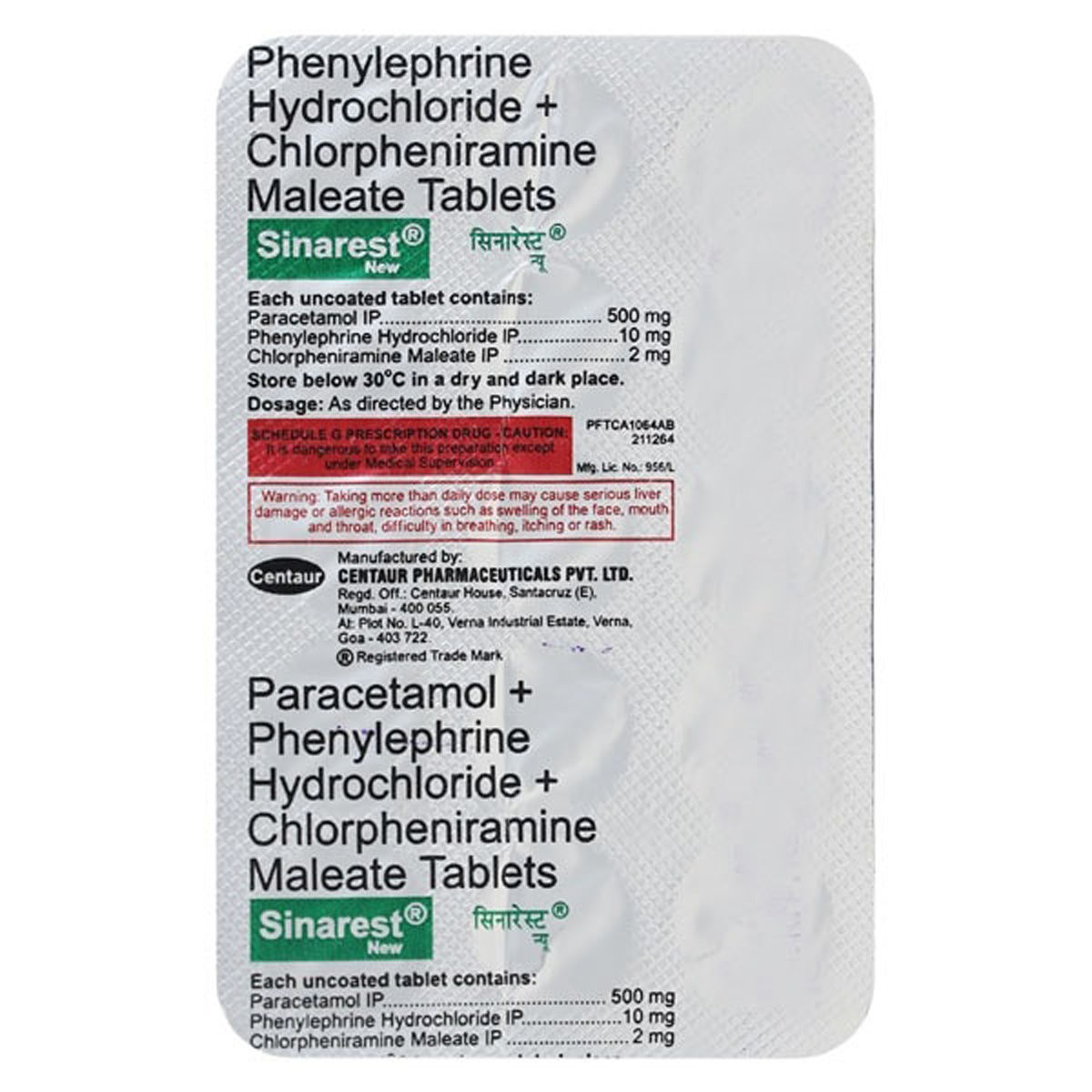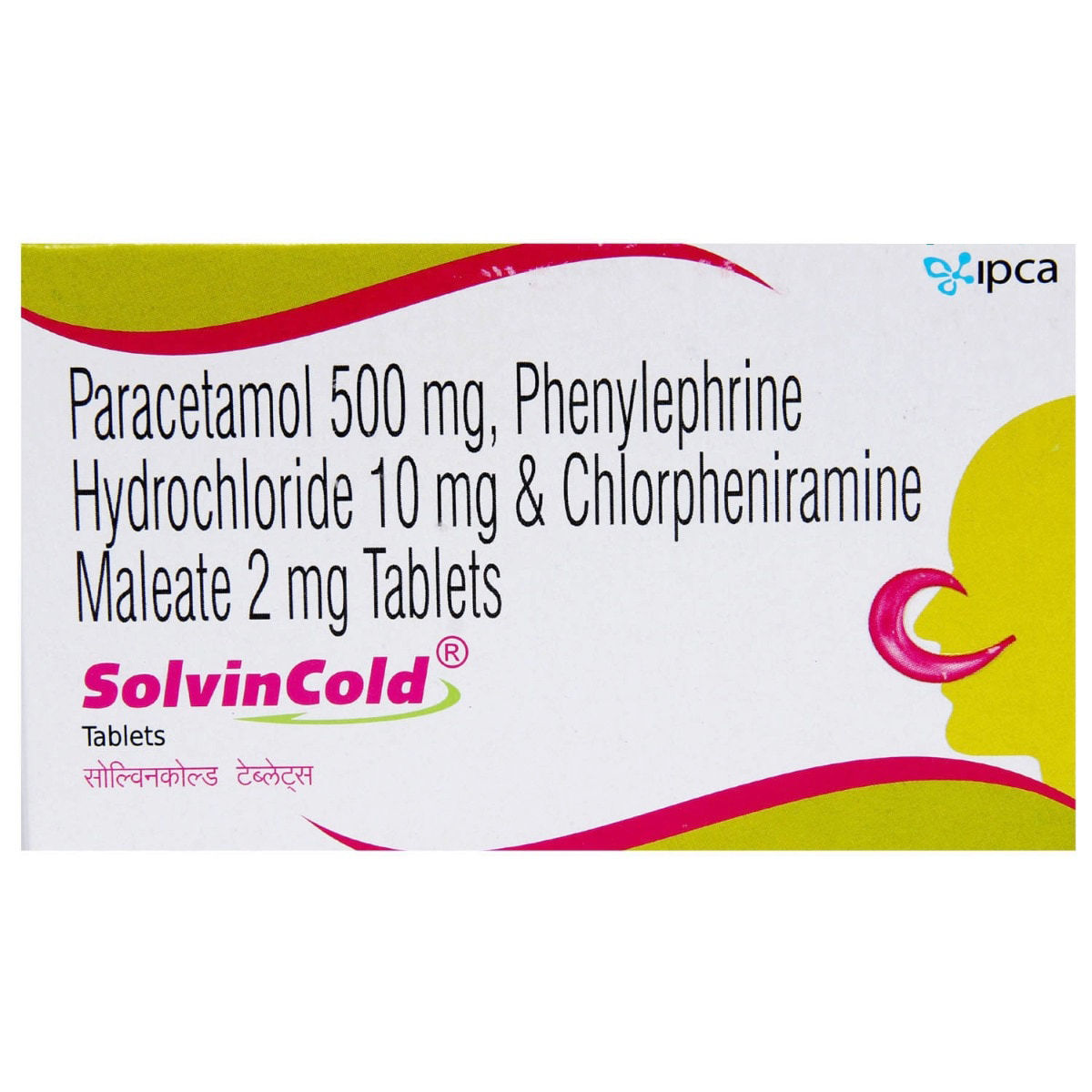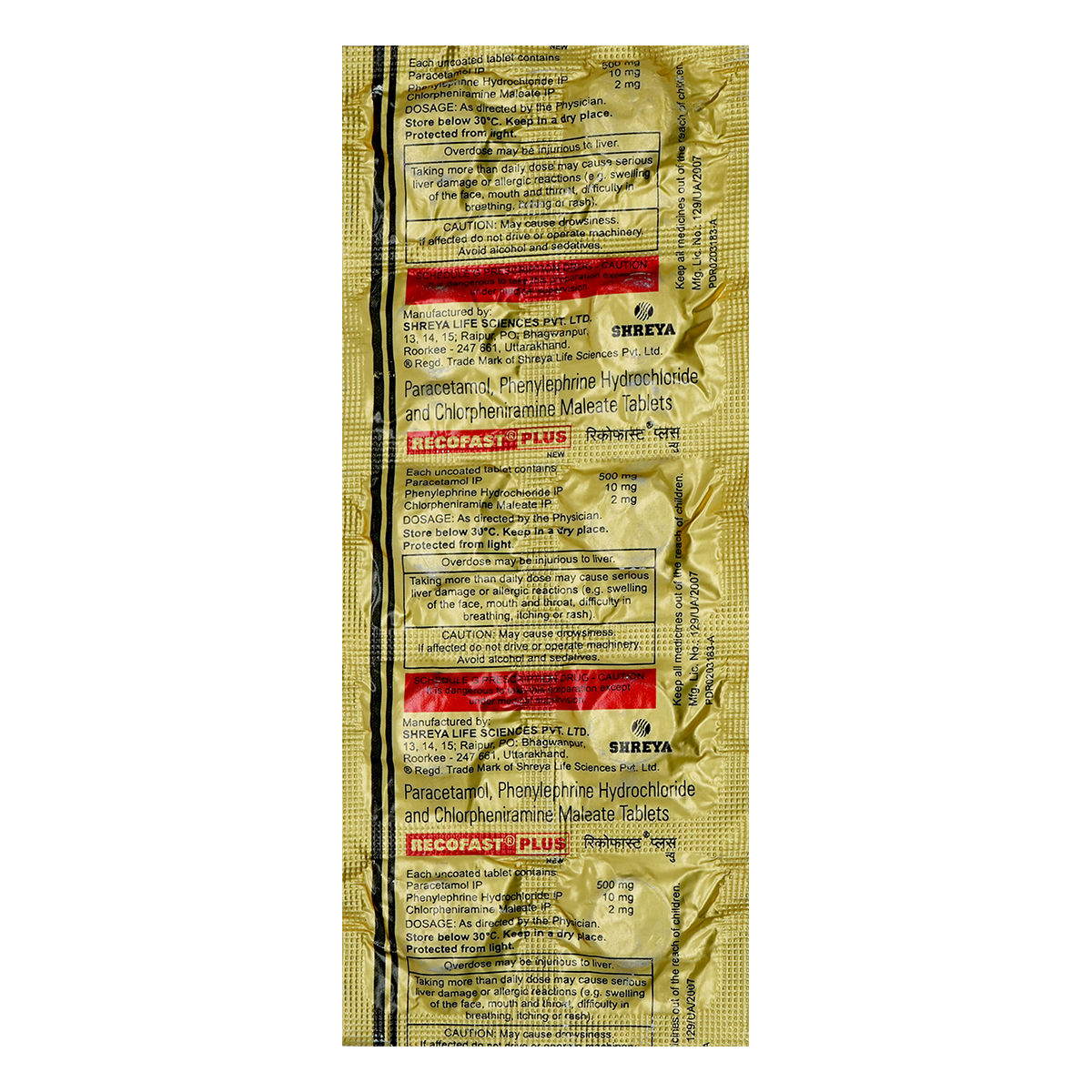Rhinoryl Tablet 10's

₹40.5*
MRP ₹45
10% off
₹38.25*
MRP ₹45
15% CB
₹6.75 cashback(15%)
Free Delivery
With Circle membership
(Inclusive of all Taxes)
This offer price is valid on orders above ₹800. Apply coupon PHARMA10/PHARMA18 (excluding restricted items)
Rhinoryl Tablet is used to treat symptoms of the common cold and allergies like sneezing, runny/stuffy nose, fever, headache, body pains, congestion, or watery eyes. It works by blocking the action of histamine, a substance responsible for causing allergic reactions. It also shrinks the blood vessels in the nasal passage. Thus, it provides relief from congestion and decreases excess mucus production. Some people may experience drowsiness, nervousness, headache, dizziness, insomnia (difficulty in falling or staying asleep), blurred vision, constipation and dry mouth. Before taking this medicine, you should tell your doctor if you are allergic to any of its components or if you are pregnant/breastfeeding, and about all the medications you are taking and pre-existing medical conditions.
Know Your Delivery Time
Provide Delivery Location
Available Offers
 Prescription drug
Prescription drugWhats That

Secure Payment

India's Most Trusted Pharmacy

Genuine Products
Manufacturer/Marketer :
Consume Type :
Return Policy :
Expires on or after :
About Rhinoryl Tablet
Rhinoryl Tablet is used to treat symptoms of the common cold and allergies like sneezing, runny/stuffy nose, fever, headache, body pains, congestion, or watery eyes. The common cold is a respiratory illness affecting the nose and throat. It is mostly caused by viruses known as 'rhinovirus'. The virus enters the body through the nose, mouth or eyes and spreads easily through droplets in the air when the person who is sick sneezes, coughs or talks.
Rhinoryl Tablet is a combination of three drugs, namely: Paracetamol (mild analgesic and antipyretic), Phenylephrine (decongestant) and Chlorpheniramine (antihistamine/antiallergic). Paracetamol is an analgesic (relieves pain) and antipyretic (reduces fever) that works by inhibiting the production of certain chemical messengers in the brain known as prostaglandins that are responsible for pain and fever. Phenylephrine belongs to the class of decongestants that works by shrinking the blood vessels in the nasal passage. Thus, it provides relief from congestion and decreases excess mucus production. Chlorpheniramine belongs to the class of antihistamines (anti-allergic drugs) that works by blocking the action of histamine, a substance responsible for causing allergic reactions. It helps to provide relief from symptoms of allergies such as sneezing, running nose, watery eyes, itching, swelling, and nasal congestion.
Take Rhinoryl Tablet as prescribed. Your doctor will recommend you how often you take Rhinoryl Tablet based on your medical condition. Some people may experience drowsiness, nervousness, headache, dizziness, insomnia (difficulty in falling or staying asleep), blurred vision, constipation and dry mouth. Most of these side effects of Rhinoryl Tablet do not require medical attention and gradually resolve over time. However, if the side effects persist or worsen, please consult your doctor.
If you are allergic to Rhinoryl Tablet or any other medicines, please tell your doctor. If you are pregnant, it is advised to inform your doctor before using Rhinoryl Tablet . Do not use Rhinoryl Tablet in breastfeeding mothers without a doctor’s advice as it may be excreted in breast milk and cause harm to the baby. Rhinoryl Tablet is not recommended for children below 4 years. Please do not take more than the prescribed dose of Rhinoryl Tablet as it may cause liver damage and can be lethal. If you have high blood pressure, diabetes, glaucoma, hyperthyroidism (overactive thyroid), chronic bronchitis, asthma, chronic obstructive pulmonary disease (COPD), blockage in stomach or intestines, enlarged prostate gland, pheochromocytoma (tumour in the adrenal glands), kidney, liver, heart or urinary problems, inform your doctor before taking Rhinoryl Tablet .
Uses of Rhinoryl Tablet
•Cold Symptom Relief: Rhinoryl Tablet is commonly used to address symptoms of the common cold, such as nasal congestion, sneezing, and a runny nose, ensuring better comfort.
•Fever Reduction: Rhinoryl Tablet contains ingredients that help lower fever, making it particularly effective for infections or colds accompanied by elevated body temperatures.
•Managing Allergic Rhinitis: Rhinoryl Tablet effectively alleviates allergic rhinitis symptoms, including nasal itching, watery eyes, and sinus pressure.
•Relieving Sinus Headaches: Rhinoryl Tablet can help ease sinus headaches caused by sinusitis by reducing nasal inflammation and congestion.
•Cough Management: Rhinoryl Tablet provides relief from cough symptoms linked to colds or allergies by reducing mucus production and supporting respiratory health.
Directions for Use
Take the medicine with or without food as advised by a doctor. Swallow it whole with a glass of water. Do not crush, chew, or break it.
Medicinal Benefits
Rhinoryl Tablet is a combination of three drugs: Paracetamol, Phenylephrine and Chlorpheniramine. Paracetamol is a mild analgesic (relieves pain) and antipyretic (reduces fever) that works by inhibiting the production of certain chemical messengers in the brain known as prostaglandins that are responsible for pain and fever. Phenylephrine belongs to the class of decongestants that work by contracting and narrowing the blood vessels. Thus, it provides relief from congestion and decreases mucus production. Chlorpheniramine is an antihistamine (anti-allergic drug) that works by blocking the action of histamine, a substance responsible for causing allergic reactions. It helps to provide relief from symptoms of allergy such as sneezing, running nose, watery eyes, itching, swelling, and congestion or stiffness.
How Rhinoryl Tablet Works
Storage
What if I have taken an overdose of Rhinoryl Tablet
Drug Warnings
If you are allergic to Rhinoryl Tablet or any other medicines, please tell your doctor. If you are pregnant, it is advised to inform your doctor before using Rhinoryl Tablet . Do not use Rhinoryl Tablet in breastfeeding mothers without doctor’s advice as it may be excreted in breast milk and cause harm to the baby. Rhinoryl Tablet is not recommended for children below 4 years. Please do not take more than the prescribed dose of Rhinoryl Tablet as it may cause liver damage and can be lethal. If you have high blood pressure, diabetes, glaucoma, hyperthyroidism (overactive thyroid), chronic bronchitis, asthma, chronic obstructive pulmonary disease (COPD), blockage in stomach or intestines, enlarged prostate gland, pheochromocytoma (tumour in the adrenal glands), kidney, liver, heart or urinary problems, inform your doctor before taking Rhinoryl Tablet .
Drug-Drug Interactions
Drug-Drug Interactions
Login/Sign Up
Co-administration of Rhinoryl Tablet with Sevoflurane can increase the levels of Rhinoryl Tablet and lead to side effects.
How to manage the interaction:
Taking Rhinoryl Tablet with Sevoflurane is not recommended, it can be taken if prescribed by the doctor. Do not discontinue the medications without consulting a doctor.
Taking Rhinoryl Tablet with Propofol may lead to increased levels of Rhinoryl Tablet leading to side effects like high blood pressure.
How to manage the interaction:
Taking Rhinoryl Tablet with Propofol is not recommended, but it can be taken if prescribed by the doctor. Do not discontinue the medications without consulting a doctor.
Taking Furazolidone with Rhinoryl Tablet can cause an increase in high blood pressure.
How to manage the interaction:
Taking Furazolidone with Rhinoryl Tablet is not recommended, it can be taken if prescribed by the doctor. However, if you experience sudden and severe headache, blurred vision, confusion, seizures, chest pain, nausea or vomiting, sweating, lightheadedness, fainting, sudden numbness or weakness (especially on one side of the body), speech difficulties, fever, consult the doctor immediately. It is advised to use Rhinoryl Tablet only after 14 days of stopping Furazolidone.
Taking Tranylcypromine with Rhinoryl Tablet can increase the risk of high blood pressure.
How to manage the interaction:
Taking Tranylcypromine with Rhinoryl Tablet is not recommended, but can be taken together if prescribed by a doctor. However, consult a doctor if you experience severe headache, blurred vision, confusion, seizures, chest pain, nausea or vomiting, sudden numbness or weakness (especially on one side of the body), speech difficulties, fever, sweating, lightheadedness, and fainting Do not discontinue any medications without consulting a doctor.
Co-administration of Selegiline with Rhinoryl Tablet together can raise blood pressure.
How to manage the interaction:
Taking Selegiline with Rhinoryl Tablet is not recommended, it can be taken together if prescribed by a doctor. However, consult a doctor immediately if you experience any symptoms such as severe headache, blurred vision, confusion, fits, chest pain, nausea or vomiting, sudden numbness or weakness (especially on one side of the body), speech difficulties, fever, sweating, lightheadedness, and/or fainting Do not discontinue any medications without consulting a doctor.
Taking Rhinoryl Tablet and Potassium citrate (in tablet or capsule form) together can increase the risk of stomach ulcers, bleeding, and gastrointestinal injury.
How to manage the interaction:
Taking Rhinoryl Tablet with Potassium citrate is not recommended as it can lead to an interaction, it can be taken if prescribed by the doctor. However, if you experience any symptoms such as severe stomach pain, bloating, lightheadedness or dizziness, nausea, vomiting (especially with blood), decreased hunger, or dark, tarry stools, consult the doctor immediately. Do not discontinue any medications without a doctor's advice.
Taking Rhinoryl Tablet and Potassium chloride (in tablet or capsule form) together can increase the risk of stomach ulcers, bleeding, and gastrointestinal injury.
How to manage the interaction:
Taking Rhinoryl Tablet with Potassium chloride it not recommended as it can lead to an interaction, it can be taken if your doctor has prescribed it. However, if you experience any symptoms such as severe stomach pain, bloating, lightheadedness or dizziness, nausea, vomiting (especially with blood), decreased hunger, or dark, tarry stools, consult the doctor. Do not discontinue any medications without a doctor's advice.
Co-administration of Lomitapide and Rhinoryl Tablet may increase the risk of severity of liver injury.
How to manage the interaction:
Although there is a possible interaction between Rhinoryl Tablet and Lomitapide, you can take these medicines together if prescribed by a doctor. Do not stop using any medications without a doctor's advice.
Co-administration of Rhinoryl Tablet and Leflunomide may increase the risk of liver problems.
How to manage the interaction:
Although there is a possible interaction between Rhinoryl Tablet and Leflunomide, they can be taken together if prescribed by a doctor. However, if you experience fever, chills, joint pain or swelling, unusual bleeding or bruising, skin rash, itching, less desire to eat, fatigue, nausea, vomiting, abdominal pain, or yellowing of the skin or eyes, contact a doctor immediately. Do not discontinue any medications without consulting a doctor.
Co-administration of Rhinoryl Tablet and Ketoconazole may increase the risk of liver injury.
How to manage the interaction:
Although there is a possible interaction between Rhinoryl Tablet and Ketoconazole, you can take these medicines together if prescribed by a doctor. However, if you have joint pain or swelling, fever, chills, unusual bleeding or bruising, skin rash, itching, over-tiredness, nausea, vomiting, loss of appetite, stomach pain, dark-colored urine, light-colored stools, and/or yellowing of the skin or eyes, contact a doctor immediately as these may be signs and symptoms of liver damage. Do not discontinue the medication without consulting a doctor.
Drug-Food Interactions
Drug-Food Interactions
Login/Sign Up
Diet & Lifestyle Advise
Wash your hands with soap and water regularly to prevent the spread of germs.
Eat plenty of foods rich in good bacteria like yoghurt to improve overall health.
Drink plenty of fluids to avoid dehydration.
Gargle with salt water for relief from sore throat.
Avoid consumption of alcohol with Rhinoryl Tablet as it may cause tiredness, drowsiness or lack of concentration.
Habit Forming
Therapeutic Class
Rhinoryl Tablet Substitute

Sinarest New Tablet 15's
by AYUR
₹7.20per tabletSolvin Cold Tablet 10's
by Others
₹6.08per tabletRecofast Plus New Tablet 10's
by AYUR
₹7.79per tabletTUSCOLD TABLET 10'S
by AYUR
₹3.90per tabletLCZ-Plus New Tablet 10's
by Others
₹6.21per tablet
Product Substitutes
Alcohol
Unsafe
Avoid consumption of alcohol with Rhinoryl Tablet as it may increase the risk of liver damage and cause increased drowsiness, dizziness or difficulty in concentrating. Please consult a doctor before consuming alcohol with Rhinoryl Tablet .
Pregnancy
Caution
The safety of Rhinoryl Tablet in pregnant women is unknown. Therefore, it is given to pregnant women only if the doctor thinks benefits outweigh risks.
Breast Feeding
Caution
Rhinoryl Tablet may be excreted in breast milk, and cause harm to the baby. Besides this, Rhinoryl Tablet may also slow milk's production, so it is better to contact a doctor before a lactating mother takes it.
Driving
Caution
Rhinoryl Tablet may cause blurred vision or impair thinking in some people. Therefore, drive only if you are alert after taking Rhinoryl Tablet .
Liver
Caution
Take Rhinoryl Tablet with caution, especially if you have a history of Liver diseases/conditions. The dose may be adjusted by your doctor as required.
Kidney
Caution
Take Rhinoryl Tablet with caution, especially if you have a history of Kidney diseases/conditions. The dose may be adjusted by your doctor as required.
Children
Caution
Rhinoryl Tablet is not recommended for children below 4 years of age. However, please consult a doctor before giving Rhinoryl Tablet to children.

Have a query?
FAQs
Rhinoryl Tablet is used to treat symptoms of the common cold and allergies like sneezing, runny/stuffy nose, fever, headache, body pains, congestion, or watery eyes.
Rhinoryl Tablet contains Paracetamol, Phenylephrine and Chlorpheniramine. Paracetamol is an analgesic (relieves pain) and antipyretic (reduces fever) that works by inhibiting the production of certain chemical messengers in the brain known as prostaglandins that are responsible for pain and fever. Phenylephrine is a decongestant that works by contracting and narrowing the blood vessels. Thereby, provides relief from congestion and decreases the mucus production. Chlorpheniramine is an antihistamine (anti-allergic drug) that works by blocking the action of histamine, a substance responsible for causing allergic reactions. It helps to provide relief from symptoms of allergy such as sneezing, running nose, watery eyes, itching, swelling, and congestion or stiffness.
Yes, Rhinoryl Tablet contains paracetamol which acts as mild pain killer (analgesic) and fever reducer (antipyretic). It works by inhibiting the production of certain chemical messengers in the brain known as prostaglandins responsible for pain and fever.
No, you are not recommended to consume alcohol with Rhinoryl Tablet as it may increase the risk of liver damage and cause increased drowsiness, dizziness and lack of concentration.
Rhinoryl Tablet is excreted in breast milk and may affect the health of baby. Therefore, if you are breastfeeding, please inform your doctor before taking Rhinoryl Tablet so that the doctor may prescribe Rhinoryl Tablet if the benefits are greater than risks.
Yes, Rhinoryl Tablet may cause drowsiness. It is not necessary for everyone taking Rhinoryl Tablet to experience this side effect. Therefore, avoid driving or operate heavy machinery if you feel drowsy after taking Rhinoryl Tablet .
No, you are not recommended to take Rhinoryl Tablet with Cetirizine as co-administration of these two medicines may increase sedation and can cause drowsiness, dizziness and difficulty in concentrating. However, please consult a doctor before taking Rhinoryl Tablet with other medicines.
No, you are not recommended to stop taking Rhinoryl Tablet without consulting your doctor as it may worsen the condition or cause recurring symptoms. Therefore, take Rhinoryl Tablet for as long as your doctor has prescribed it, and if you experience any difficulty while taking Rhinoryl Tablet , please consult your doctor.
Do not use Rhinoryl Tablet if you have used an MAO inhibitor in the past 14 days, like isocarboxazid, linezolid, phenelzine, rasagiline, selegiline, or tranylcypromine. Tell your doctor before taking Rhinoryl Tablet if you have nausea, stomach pain, itchy skin, loss of appetite, dark urine, clay-coloured stools, or jaundice (yellowing of your skin or eyes). In rare cases, paracetamol present in Rhinoryl Tablet may cause a severe skin allergic reaction. So, if you observe any skin blisters or redness or rash, immediately contact your doctor and stop taking Rhinoryl Tablet .
The number of Rhinoryl Tablet doses to be taken daily varies from person to person, depending on factors such as health needs, age, and gender. Take the number of doses of Rhinoryl Tablet as a doctor instructed. It's always essential to follow the dosage instructions provided by a healthcare professional, as they consider several factors that are suitable to you before recommending.
Rhinoryl Tablet is a combination medication that contains Paracetamol, Phenylephrine and Chlorpheniramine used to treat symptoms of the common cold or flu. Whereas Paracetamol is a single-ingredient medication primarily used to reduce fever and relieve mild to moderate pain, such as headaches, muscle aches, or toothaches.
Rhinoryl Tablet combines Paracetamol, Phenylephrine and Chlorpheniramine, which are used to treat common colds and allergies, including sneezing, runny nose, congestion, fever, and headache.
Rhinoryl Tablet is generally considered safe when used as prescribed by a doctor. However, like all medications, it can have side effects and potential interactions with other drugs. It's important to follow your doctor's instructions and inform them of any pre-existing and existing medical conditions or medication history to avoid adverse complications.
You are recommended to stop taking Rhinoryl Tablet if your symptoms are relieved only after discussing with your doctor. Generally, it is always best to complete the full prescribed course duration for complete relief. Your doctor will ensure your relieved status, provide guidance based on their observation, and avoid the recurrence of the symptoms.
Rhinoryl Tablet may cause dizziness in some individuals, as it is a reported side effect. If you experience this, take some rest, as the effect typically resolves over time. However, if you experience severe or continuous dizziness, please inform your doctor promptly.
Rhinoryl Tablet may damage the liver, especially when taken in high doses or for extended periods and with pre-existing liver diseases. Paracetamol, one of the active ingredients in Rhinoryl Tablet , can also cause liver damage if not used as directed. To ensure safety, follow your doctor's instructions carefully and inform them if you have any pre-existing liver conditions.
Store Rhinoryl Tablet by keeping it cool, dry, and out of sunlight. Make sure to keep it out of the reach of children.
The common side effects of Rhinoryl Tablet that may occur in some individuals are drowsiness, nervousness, headache, dizziness, insomnia (difficulty falling or staying asleep), blurred vision, constipation, and dry mouth. Most of these side effects of Rhinoryl Tablet do not require medical attention and gradually resolve over time. However, if the side effects persist or worsen, please consult your doctor.
Country of origin
Manufacturer/Marketer address
Disclaimer
Author Details
We provide you with authentic, trustworthy and relevant information


















